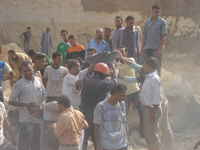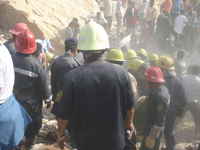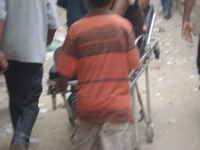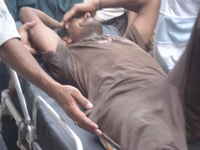Cairo, Al-Doweqa Area Witnessed 20 Dead, 35 Injured and about 500 remain under the wreck
On Saturday (6/9/2008), a lump of rock collapsed on a number of houses of the poor people in Al-Doweqa area related to Mansheyet Nasser Section (West of Cairo). Until now the result of the disaster is 20 dead and 35 injured people; however, moreover 500 people still under wreck.
Still after 8 hours of the collapse, rescuing is very primitive. Thus, there are no cranes to lift up the huge rocks and that raises the expectation of increasing numbers of victims. In addition, local administration resorted to the armed forces to help in rescuing the inhabitant; however roads are not paved which prevents cranes from getting into the area.
The people of Doweqa told the Egyptian Center for Housing Rights (ECHR) that immediately after the collapse had happened, security forces closed the area and prevented them from rescuing the victims, but they succeeded in break the security cordon and started the rescue process.
It is worthy to mention that, Mansheyet Nasser area covers a population of more than half million inhabitants. In the 90's of the last century and in a similar incident, President Mubarak had ordered to demolish the whole area and build it again. Under the pretext of lack of resource, the government decided to develop a part of the area and demolish and rebuild the other part that is Al-Doweqa.
After the previous incident, despite their dreams by proper housing units, Al-Doweqa people live with fear all the time because of the governmental plans. Thus, many inhabitants whose houses have been demolished in earlier stages didn't receive alternative houses and others received new units in remote areas that far from their work places such as Badr City. Moreover, the infrastructure processes in the area brings danger to the old houses of the area and that could result in the collapse of the old houses.
However, the government has previously built houses by a grant from Abu Dhabi Fund and the German Association (GTZ) to hundreds of citizens whom are waiting for their turn, but the responsible officials for the project work in slow motion to deliver the houses. ECHR, who has been working on this area for more than 8 years, received many complaints that reveal the corruption in distributing housing units in which they are given by officials to the unneeded people.
ECHR had convened a meeting before with chief of Mansheyet Nasser Section to discuss the inhabitants' problems; however, ECHR's members discovered that the official deal with the people in an inferior way, his talk reveals that the government provides the poor people with what they don't deserve and claims that they are dishonest. ECHR's members recognized that the Chief of the Mansheyet Nasser has no sense of responsibility for the poor people's lives.
This disaster is not the first one in this area, and if the current governmental policies remain as they are, it will not be the last.
The housing policy that the government adopts, gives no attention to the poor, as the poor sufferance from increasing poverty and the difficulty they face in securing their daily food, as a result of the unfair governmental policies, is not enough, they have also to pay their lives as a price for these polices.
From another hand, the Egyptian government always talks about the number of permanent houses it built; however, it is a false interpretation of the right to adequate housing. It must give the priority to a policy for temporary housing for the people who are without shelter and people whose houses brings danger to their life, similar to Al-Doweqa's disaster and the many more random areas where danger exist by different means.
The question now is that: would the Egyptians let this disaster go without charging the officials who neglected that danger on poor people's lives as it always happens in all the previous disasters. Though, ECHR calls for judging the officials who are responsible for this great lose of lives, providing adequate remedies for the victims and their families, and adopting a governmental policy for temporary housing for people without shelter and people who live in dangerous houses.
Address: 33 Kasr Al Nile St., Ninth Floor, Cairo, Egypt
Phone and Fax: + 202 23922194/ + 202 2395295
Email: echreg@echreg.org
Cairo disaster 'could happen again'




